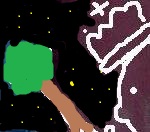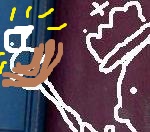Full Disclosure: Saw McMillan read at the Forward Prize, this is my first time reading his work. Aware of several prize wins/nominations.
Review: To get it out of the way, one of the most infuriatingly shitty reviews I read in all of 2015, was by Gregory Woods in the Jan-Feb 2016 edition of PN Review (full text hastily but legibly screengrabbed here). Woods begins by comparing McMillan’s stylish and purposeful use of Yorkshire English to illiteracy, before suggesting it could only have been a result of mistakes by both poet and editor; concerns about non-standard English comprise about half his word count. Woods’ next argument, that McMillan is not being a gay poet correctly (his deployment of homophobic binaries on the topic is baffling, particularly given his academic career as a professor of LGBT studies) is utterly meaningless as critique and seems designed to cause personal hurt. Woods also belongs to the school of thought that the ‘new generation’ (whatever that means) has been ‘rendered half-mute by new taboos’ (whatever those might be). The review is close-minded, vindictive and barely literary; much like other critics of his generation, Woods cannot bring himself to consider McMillan’s ideas worth engaging on their own terms, nor can he abide the thought that someone might want to do things differently to himself. Regarding his pithy parting shot, if Woods had access to a half decent dictionary surely he would know that the singular ‘biceps’ is also perfectly acceptable; it’s this kind of monolithic thinking about minor details at the expense of the bigger picture that leaves his review intellectually bankrupt. As a lifelong member of a half-mute generation, unbelievable horseshit like this can get in the fucking sea.
ANYWAY.
physical is McMillan’s first full collection, and includes the sequence ‘protest of the physical’, which was published as a pamphlet by Red Squirrel Press in 2013. The book clocks in at around 45 pages, a handful of which feature section titles and epigrams; it simultaneously feels ruthlessly efficient and deeply invested in the importance of white space on the page. It’s tempting to read this editorial approach as commensurate with the poems’ attitude to the body; ‘Jacob with the angel’ pointedly talks about its protagonists in terms of their physical fitness:
‘no soft parts of stomachs no inch of them hung loose
like old sacking from the muscle’
I don’t think this is uncomplicated praise for the flawlessness of strength or bodily aesthetics, however, particularly not alongside a poem like ‘the men are weeping in the gym’, of which more later. Here, the inability of either Jacob or the angel to give way, to permit weakness or vulnerability, fades into the allegorical reading of the second stanza, in which Jacob ‘is beating on himself’, bruised and already forgetful: ‘on waking / he isn’t sure if he has dreamt it’. The poem seems to be characterised as much by the unfulfilling aftermath as the rational-thought-transcending act (and even that is framed as happening ‘the way the weather / or the stock market happens’ – which is to say, I think, as a result of intensely complex, but strangely desire-less or agency-less systems). The resolution to remain anonymous in the first stanza –
‘because names would add a history
and the tasting of the flesh and blood of someone
is something out of time’
– leads directly to Jacob’s closing request ‘for ink to be brought / he says writing something down keeps it alive’. It’s very much up for debate whether memorialising is a good thing, however; certainly it flies in the face of the first stanza’s argument for preserving the one-off, no-strings sanctity of their meeting.
‘Jacob with the angel’ establishes an important point of friction in the collection. Throughout its lyrical moments of intimacy – or, more often, physically proximate solitude – there is a deep sense of unease about the processes that turn these private moments into the poems’ public gestures. Numerous individual pieces, (‘screen’, ‘Saturday night’, ‘if it wasn’t for the nights’, the excoriatingly sad ‘a gift’) even in their beautifully articulated understandings of emotional and physical exchange, seem to have at their heart a desire to explain themselves, even to apologise. The poems’ action remains just at the edge of focus, as the poem attempts to recreate the conditions in which their protagonists’ decisions start to make sense. McMillan’s speaker (though the book indicates autobiography, I’m not entirely comfortable just taking it for granted) presents the poems’ lovers unsparingly, often pitifully; in ‘screen’, the speaker watches his lover watch porn, because ‘I knew / that you would end up loving me too / much I thought you needed other idols’. What makes these pieces powerful, makes them so heartbreakingly comprehensible, is their willingness to demonstrate the speaker’s own culpability without reaching for self-defensive explanations. Though the poems seem to stand at a clinical remove from their often extremely vulnerable subjects, there is little space for romanticism; the first instinct of ‘Jacob and the angel’ is to take it ‘literally’ before ‘allegorically’, and it is in the allegory that the true mint is betrayed.
At the centre of the collection is the sequence ‘protest of the physical’, in which the lyric essays elsewhere in the collection are allowed a degree of freedom to roam, the book’s emotional reservations or compromises (‘love / is giving everything too easily / then staying to try and claw it back’) put into a slightly broader social context. It’s partly a coming of age piece, characterised by a kind of earnest, brash curiosity that wants to transform its immediate surroundings (‘town as a dialogueheavy scene from a Ken Loach film’), and find in Thom Gunn’s poems an alternative reality, a counterweight to the outside world where graffiti reads ‘pits close / we still sink / into them’. The sequence is also pleasingly unconvinced about the essential otherness of the poet, as either paragon of higher thought or necessarily removed from their community:
‘station walkhome man in the doorway
of The Mount looking up g night luv
theory the moon isn’t just for poets’
While ‘protest of the physical’ by its nature asks the reader to engage with some throwaway or slightly rambly thought-processing, it’s a welcome, rangy departure from the densely woven lyrics elsewhere in the book, and has a few of its best lines: ‘theory we’ve confused happiness / with someone being able to say our name to us’. It may feel a little younger (whatever that means) in its occasional dreaminess or unironic hero-worship, but that element of embattled optimism carved out of a place that ‘carried // young men and women […] / as long as it could but spinebroken / had to let them go’, is a valuable addition physical‘s emotional register.
Elsewhere, there’s something productively dissonant about the poems’ sure-footed, almost stately composure and the turmoil it conveys; after a close read or two, it was this apparently unbridgeable gap that started causing some serious heartsickness. The poems that arc towards closeness and understanding are notable in their relative absence. One such piece, ‘yoga’, starts off from a point of fairly conventional scepticism:
‘we are told to tell our bodies that they are beautiful
we are told not to pass judgement
on where the breath may fall’
The prefix ‘we are told’ acts as a kind of buffer while allowing the teacher’s message to pass on regardless, a kind of double bluff before the poem fully absorbs it: ‘it needs trust in the strengthofbody / of another to support your own’. At the conclusion, a full awareness and acceptance of both being a body and being subject to that body’s needs results in a deeply peaceful moment in the middle of a thoroughly unsettled collection:
‘I had forgotten that loving could feel so calming
telling you that your body was beautiful sighing out
the brittle disappointments from the bones
having no judgement of what the body
may want to be doing where the breath may fall’
This, I think, connects to the heart of the book’s ongoing discussion of masculinity, specifically a socially conventional masculinity that physical clearly views as toxic and harmful, both to the individual and those around him. Several poems deal directly with male identity politics that demand its adherents remain not only destructive but downright stunted. The aforementioned men weeping in the gym are cartoonish and childlike:
‘their hearts have grown too big
for their chests their chests have grown too big
for their shirts they are dressed like kids
who have forgotten their games kit’
The gesture, however, is at least to some degree self-directed; the very next piece is ‘strongman’, in which the speaker bench-presses his homophobic nephew and asks ‘what is masculinity if not taking the weight // of a boy and straining it from oneself?’ McMillan seems perfectly aware that the beautiful, muscular bodies that appear throughout the collection (and on the book’s cover) are subject to similar social norms; both ‘choke’ and ‘Leda to her daughters’ address directly a connection between physical beauty and physical violence. The failure of the men in the gym to accept ‘the thousands of tiny fracturings / needed to build something stronger’ identifies – much as in ‘yoga’ – that relatively little strength (physical or figurative) is needed to stay a safe distance from those you love, that it is far easier to push one’s emotional immaturity away than to confront it.
Both ‘the men are weeping in the gym’ and ‘strongman’ play out masculinity’s failure to accommodate self-questioning or even self-love; despite the ostensible comedy in these scenes, physical makes it absolutely clear that this failure has very real victims. ‘Leda to her daughters’ is a sad, angry piece that renders clearly the neediness and violent thoughtlessness that accompanies the masculinity defined elsewhere in the book. The poem suggests that the myth’s most mundane aspect is
‘to pretend he didn’t understand
to think my outstretched hand might be an offering of food
daughter to think that I would feed him’
Here, the act of wilful ignorance – an echo of ‘swearing […] that the words they mutter as they lift / are meaningless’ from ‘the men in the gym are weeping’ – is directly connected to the sexual abuse of the myth. The poem’s plain speech locates it in the absolutely contemporary, and the use of persona (one of very few in physical) allows the possibility that the speaker of the other poems might be more easily located as the thoughtless aggressor; as mentioned, physical is all too aware of its own capacity to harm. It’s uncompromising and sometimes angry in its expression, and like elsewhere in the book, its emotional frankness is what gives it such force. The photograph on the front cover, which first appears beautiful and alluring, the model’s fingers pushing fulsomely into his own side, starts to appear self-defensive and vulnerable, and a lot less sexy. It’s rare enough for a male poet to spend so much energy on such deep self-criticism, and in McMillan’s hands it becomes something uncommonly powerful.
tl;dr: physical is a complex and deeply human book, with some of the finest and most clear-eyed poems about love and personal-level power dynamics I’ve read in a long time.
Further Reading: Ben Wilkinson in The Guardian
Interview in the Yorkshire Post
McMillan on Thom Gunn in The Guardian
PS: If you enjoyed this and would like to help me keep doing this, please have a look at my Patreon. You can pledge as little as $1/month, and you can cancel at any time. Thanks for reading.



One thought on “Andrew McMillan – physical”